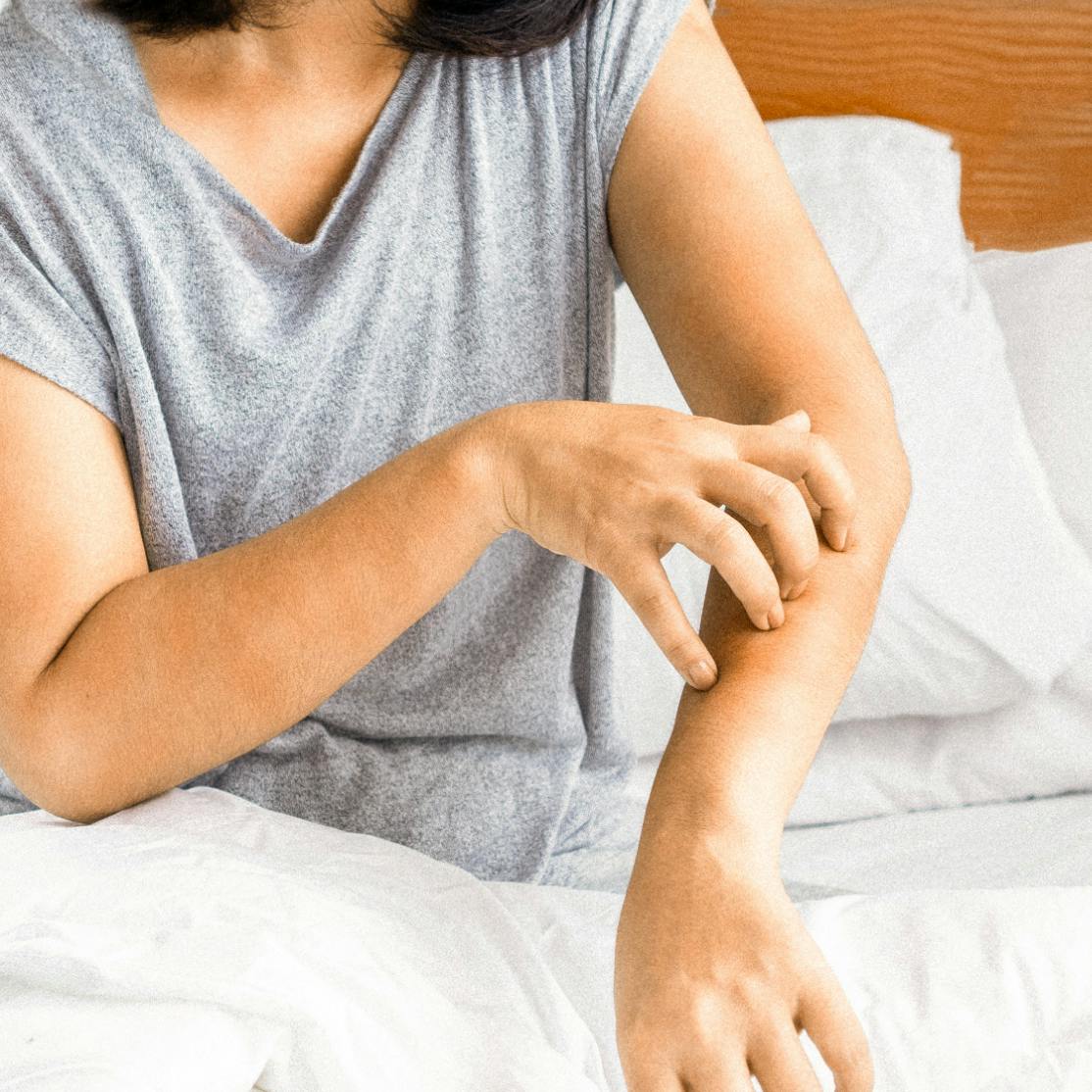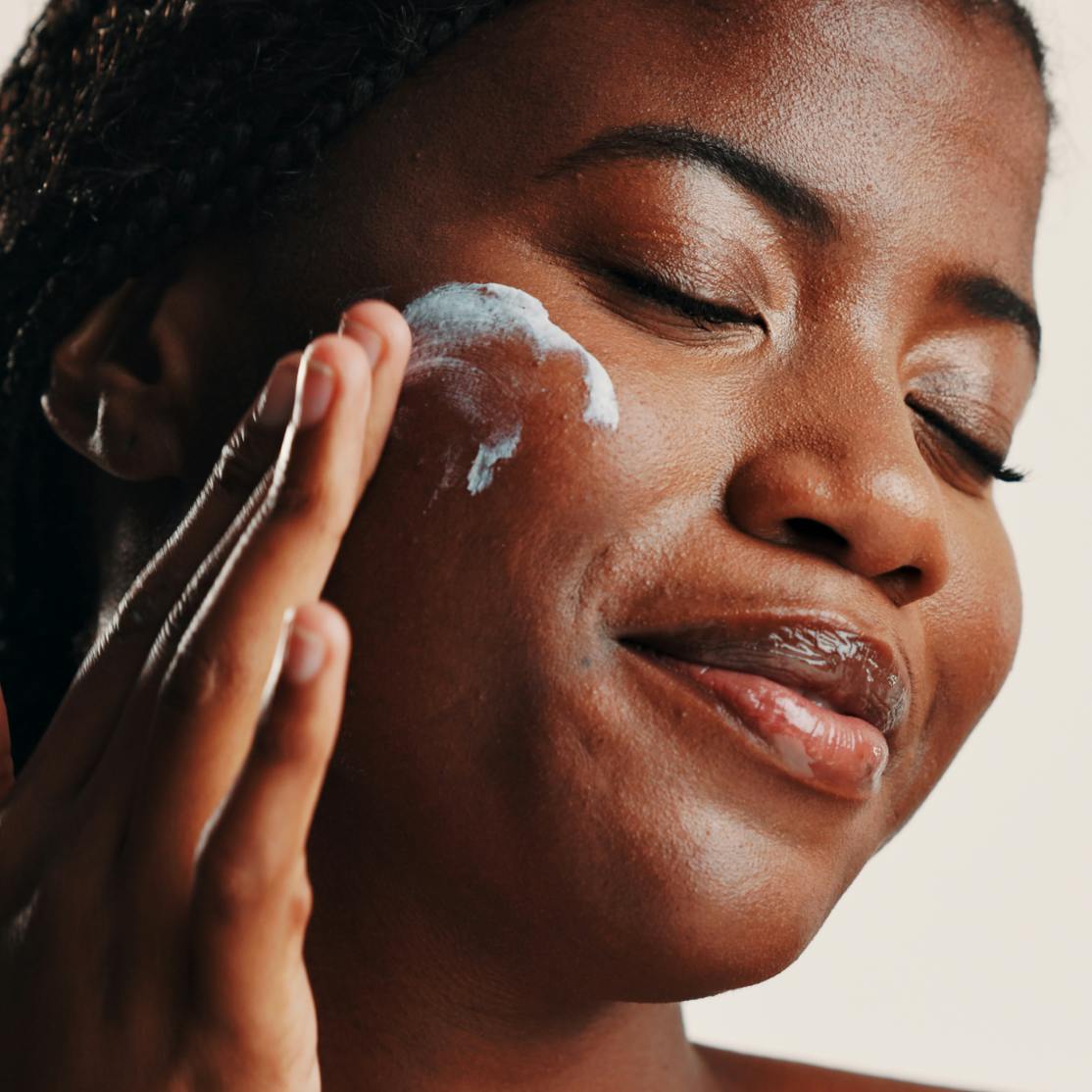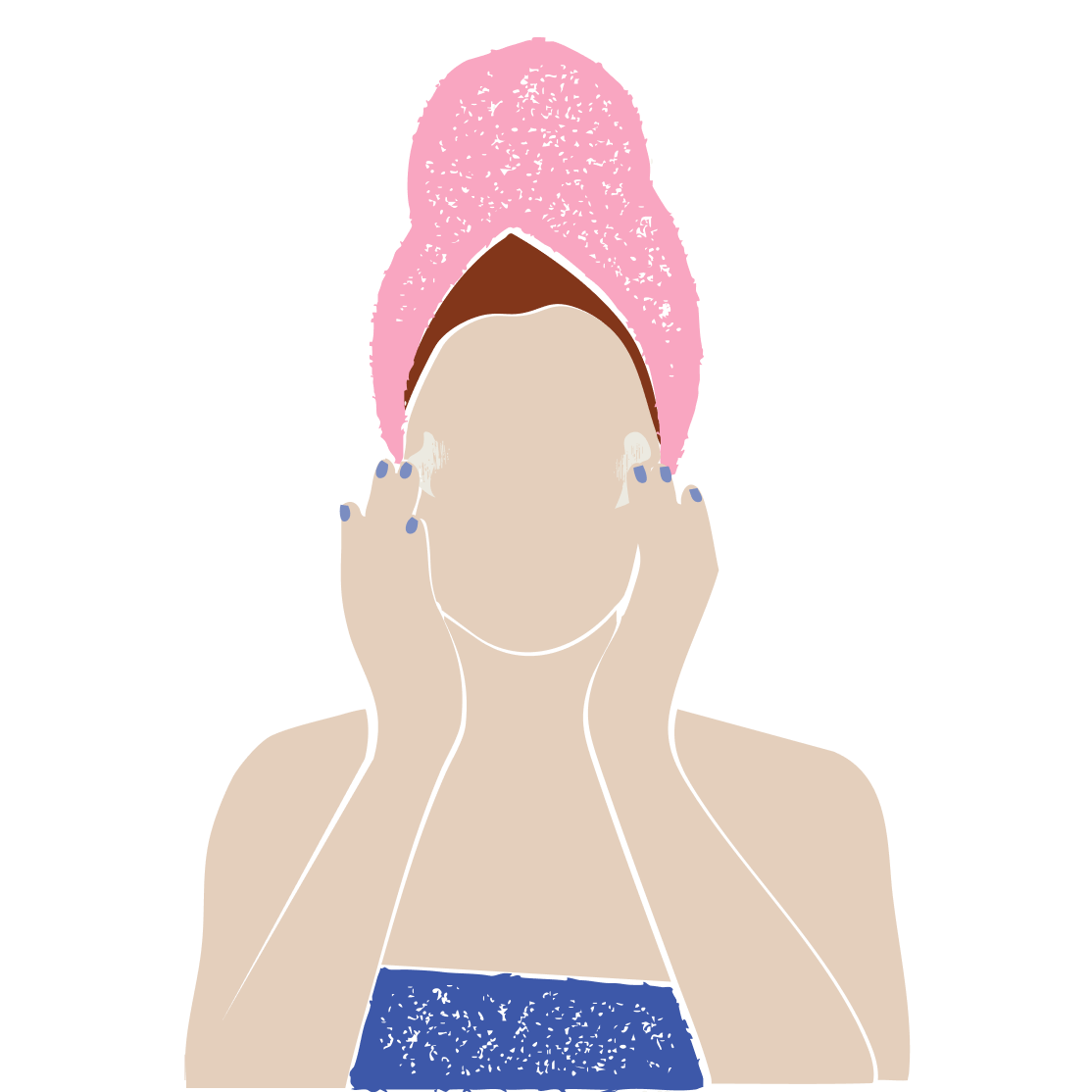Perimenopause itchy skin is one of the symptoms of hormonal change that takes many women by complete surprise. After all, it’s hard to see how the two are connected. Sure, you may expect the hot flashes and night sweats and maybe even some mood changes, but to suddenly feel uncomfortable in your own skin can be a total head-scratcher (wink, wink).
But we’re here to tell you: You’re not imagining things. Itchy skin in perimenopause is real, as estrogen loss during midlife can set the stage for drier, more irritated skin from head to toe. And some women even notice incredibly bothersome, itchy ears in perimenopause. Read on to find out the why behind it all—and more importantly, how to make it stop.
What isn’t new in perimenopause? Your periods suddenly stop being so routine, your mood may be unlike what you’ve experienced before, and hot flashes have a way of popping up at the worst times. Now, on top of all that, you can add…weird itching? Fun times, said no one ever.
Many midlife women don’t realize that itchy skin can be a symptom of perimenopause (that is, until hormone treatment relieves it). Research suggests that skin issues like dryness and itchiness are often overlooked symptoms of perimenopause that don’t get the attention they deserve.
At Midi, we often hear from women who are both shocked to learn there’s a link to perimenopause and relieved to finally have an answer for why they’ve had such a sudden increase in scratching. Here, we’ll explain why perimenopause can cause itchy skin and how to treat it.
Understanding Perimenopause Itchy Skin
Skin changes during perimenopause are as common as they are frustrating. From more fine lines to drier skin to noticeable sagging, it’s easy to feel like your skin is turning on you with no warning. While these are all normal parts of aging, no one prepares you for the itching. Oh, the itching. It’s enough to drive anyone bananas.
So, what exactly is going on? First, it’s helpful to understand perimenopause, so you can get a clear picture of why your skin is suddenly staging a revolt.
Perimenopause is defined as the years before menopause, when the hormones estrogen and progesterone start to shift and decline as your body closes out your reproductive years. This rocky hormonal descent can trigger a series of symptoms because estrogen plays a key role in so many of your body’s processes.
Estrogen’s Role in Itchy Skin
Estrogen is especially notable when we’re talking about skin health, largely because our skin has lots of estrogen receptors that help regulate the production and maintenance of collagen and elastin—two key proteins that keep skin firm and elastic. When estrogen levels drop, collagen and elastin production slow, which can lead to thinner skin, more fine lines, wrinkles, and sagging. Estrogen also helps with skin hydration, oil production, and the maintenance of a healthy skin barrier, so it's no surprise your skin feels drier now, too.
Dry skin is itchy skin. Anyone who's ever experienced cold, dry winter days knows that skin sapped of moisture is especially scratchy. Estrogen-deficient skin is no different, and it can make you feel like you’re experiencing the drying effects of winter all year round. In fact, one small survey of 50 women, published in the journal Post Reproductive Health, found that 78% reported itchy skin as an ongoing symptom.
To make matters worse, scratching with your nails—even though it's hard to resist—can cause tiny breaks in your skin, further disrupting its protective barrier. That barrier's job is to keep irritants out, so when it's compromised, you can end up even itchier. Talk about a vicious cycle.
Why Perimenopause Causes Itchy Ears
Perimenopausal itching can show up just about anywhere on the body—but one surprising spot you might not expect? Your ears. Yep, itchy ears are a lesser-known but totally normal symptom, especially because we don’t usually think to moisturize them, yet they're just as likely to be dry, flaky, and scratchy as anywhere else on the body. (Plus, if you’re prone to eczema, some women find that the condition flares with hormonal changes.)
Another reason to blame estrogen: Estrogen loss during perimenopause also affects the moisture levels in your body’s mucous membranes, which include tissues in your ears. So not only might you feel itchiness on the outside, but the itch might also come from deep within your ear canal, making you fantasize about sticking an extra-long cotton swab in there for relief. (For the love of your eardrum, don’t do this.)
Of course, you can apply the same skin moisturizer you use on your face to the skin of your outer ear to see if it helps. We also like this tip from @drmaryclaire, who recommends putting a little bit of your Estrace or vaginal estradiol cream on a cotton swab and placing it on your outer ears and lobes 2 or 3 times per week. (We recommend using our face cream for this, since its formulation is more suitable for the skin on your face and ears.) Ask your clinician before doing this, though, and—same warning as above—do not insert the cotton swab into your ears.
How to Stop Perimenopause Itching: Practical Tips
Read on for expert-approved strategies to tackle itchiness that will also boost overall skin health and may even improve the appearance of your skin.
Effective skincare routine adjustments for itchy skin
When you have dry, itchy skin, the name of the game is gentle skincare. The idea is to help repair a compromised skin barrier and restore lost moisture. Start with nailing the basics:
- Choose gentle, fragrance-free soaps and cleansers.
- Regularly moisturize with barrier-restoring creams and moisturizers. Look for products that contain ingredients like ceramides and niacinamide. Urea and dimethicone can also help improve scaly skin. (If you know you have sensitive skin, look for creams that are also fragrance-free.)
- Protect your skin while outdoors. Excess sun exposure and cold, dry air increase dryness, says the American Academy of Dermatology. Regularly wear sunscreen and sun-protective clothing, and wear gloves in the winter to protect your hands.
- Treat allergy symptoms. Seasonal allergy symptoms can worsen with hormonal change and trigger itchiness. If you’re having other symptoms (sneezing, congestion, runny nose, itchy eyes), make sure you’re treating your allergies appropriately.
Hydration strategies to ease itching
If you struggle to drink enough water during the day, let your dry skin motivate you into new habits. Research involving young, healthy women suggests that those who upped their water intake to 2 liters per day for one month had improved skin hydration, especially when they weren’t drinking a lot of water to begin with. Don’t forget that water-rich foods like fruits and veggies count toward your water intake. And limit alcohol, which can dehydrate you.
Bathing tips to relieve itchy skin
Hot, am-I-scalding-my-skin showers can feel really great. (We get it.) But the downside is that all that heat strips your skin of its natural moisture. If you can, try dialing down the temperature and opt for lukewarm showers instead. And keep your showers or baths short and sweet. As soon as you step out, pat your skin dry and apply moisturizer while your skin is still slightly damp—that helps lock in hydration and keep dryness at bay.
Environment and lifestyle adjustments
The health of your skin is influenced by what’s going on in your body and outside of it. When it comes to environmental factors, these tips can help promote a healthy skin barrier, which may ease itching:
- Use a humidifier to add moisture to indoor air and help keep skin from drying out.
- Wear soft, breathable clothing.
- Incorporate stress management strategies into your day. Stress can trigger itching, and persistent itching can increase stress. This cycle is often driven by underlying inflammation in the body—an immune response that causes the skin to become more sensitive, irritated, and prone to itchiness.
Natural Remedies for Perimenopausal Itching
Inflammation is the body’s natural response to injury, infection, or irritants. In skin conditions, this can cause redness, swelling, and itching. Of course, your natural instinct is to scratch, which can damage the skin further, increasing inflammation and fueling a cycle of discomfort.
If you’re especially itchy, you may want to try a colloidal oatmeal bath. The oats, which have antioxidant properties, have been shown to decrease proinflammatory proteins to improve skin dryness, scaling, and itch. (Bonus: Baths are great for stress, too.) If you don’t have time for a full soak, apply cool compresses to especially itchy areas of skin.
Your diet may not directly cause itchy skin (unless you have a food allergy), but it does have a big impact on your overall inflammation levels and skin health. Consuming plant-based foods rich in antioxidants and healthy fats like omega-3 fatty acids is part of an anti-inflammatory diet.
Medical and Therapeutic Options
When your itching starts affecting your everyday life—bothering you during the day, distracting you, causing distress—it’s time to seek help from a healthcare professional, like a Midi clinician.
If you’re having additional perimenopausal symptoms, such as hot flashes, night sweats, mood changes, insomnia, weight gain, and more (dozens of symptoms can pop up during perimenopause and menopause), it’s worth setting up a treatment plan.
Treatment might include:
- hormone replacement therapy (HRT)
- Topical estrogen cream
- lifestyle changes that support hormonal health (like the ones mentioned earlier)
While medication like HRT is not specifically designed to treat perimenopause skin itch, it does supply your body with additional estrogen (and progesterone, if you have a uterus) to increase tissue thickness and moisture all over. Research has shown that HRT improves skin texture, hydration, collagen production, and elasticity—all of which impacts how itchy you feel.
Coping Strategies for Nighttime Itching
Nighttime itching is a terror situation of its own. Scratching can make it tough to fall asleep, and if itchiness is severe, it may even wake you up. Here are our tips to deal with perimenopause itching at night:
- Run a humidifier in your bedroom.
- Keep your bedroom cool to limit sweating.
- Use cooling or breathable bedding (again, to reduce night sweats).
- Wear lightweight, breathable sleepwear that keeps itchy areas covered (to protect against itching).
- Shower (or take a colloidal oatmeal bath) and apply body moisturizer before going to bed.
- Try relaxation strategies before bed, such as light stretching, meditation, or deep breathing (no doomscrolling!).
- Practice general sleep hygiene, including the above strategies, and stick to regular sleep and wake-up times. Good sleep can help reduce stress and itchiness.
Preventing Further Skin Irritation
Once you’ve had one bout of super itchy skin, you don’t want it to happen again. The same things you did to soothe itchiness can also help prevent irritation in the first place:
- Identify triggers for your itch—such as seasonal allergens, skincare products, clothing fabrics, weather, or stress—and do what’s in your control to limit or address them (like by following our earlier suggestions).
- Practice gentle skincare by using fragrance-free products, regularly and frequently moisturizing, and taking shorter, cooler showers. Doing this all the time, not just during itchy flares, can help keep itching at bay.
- Ask your clinician whether you could benefit from a topical estrogen cream or HRT if you’re experiencing multiple symptoms of menopause.
Key Takeaways
- Perimenopause itching is a frequent complaint among midlife women.
- Estrogen deficiency during menopause affects the structure, thickness, and moisture of tissues throughout your body, including your skin. This can lead to dryness and itching.
- Gentle skincare habits, such as choosing fragrance-free products, taking lukewarm showers, and regularly moisturizing, as well as stress management, hydration, and good sleep, can all help reduce inflammation and soothe skin.
- For women who have other symptoms of menopause, medical treatment like HRT may also help improve skin health.
Frequently Asked Questions (FAQs)
Can perimenopause cause itching all over the body?
Yes, the decline in estrogen that starts in perimenopause can trigger skin dryness. You can feel itchy only in certain spots on your body (such as your ears or legs), or you may feel it all over.
How do you stop hormonal skin itching?
You can do many things to stop hormonal skin itching, starting with creating a healthy skincare plan. Use skincare products that are gentle and fragrance-free, apply moisturizer throughout the day, manage stress as best as you can, try to get good sleep, and eat a nutritious diet while drinking enough water. A clinician may recommend trying a topical estrogen cream or HRT if you have other symptoms of menopause.
What is the average age for perimenopause?
On average, perimenopause begins in your mid-40s. For some women, it starts as early as their 30s or as late as their 50s. But keep in mind: From your mid-20s onward, your skin will lose about 1% of its collagen each year. Loss of collagen contributes to dryness and less firmness.
What does hormonal itching feel like?
Hormonal itching isn’t much different from regular itching. But some women point out that they have extreme ear itching in perimenopause, describing it as an itch that’s deep in their ear canal.
If you’re in perimenopause or menopause and want guidance from clinicians who specialize in women’s midlife health, book a virtual visit with Midi today.
Hormonal change is at the root of dozens of symptoms women experience in the years before and after their period stops.
Our trained menopause specialists can help you connect the dots to guide you towards safe, effective solutions.
Whether you need personalized guidance or a prescription routine to tackle symptoms—including brain fog, hot flashes, sleep trouble, mood swings, and weight gain—we’ve got you covered. Learn more here.
Midi’s mission is to revolutionize healthcare for women at midlife, wherever they live and whatever their health story. We believe that starts with education, to help all of us understand our always-changing bodies and health needs. Our core values guide everything we do, including standards that ensure the quality and trustworthiness of our content and editorial processes. We’re committed to providing information that is up-to-date, accurate, and relies on evidence-based research and peer-reviewed journals. For more details on our editorial process, see here.








